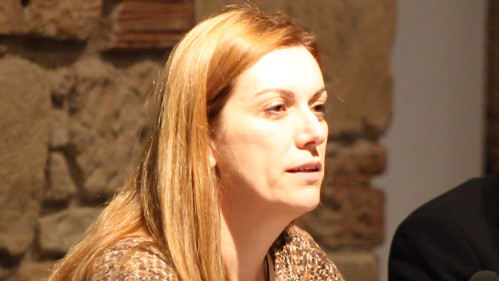
I have some keywords as reflection of today’s presentations.
One is ‘CREATIVE’ as a keyword, and as an interdisciplinary challenge. ‘Creative’ industries makes sense in the UK cultural disciplines and the UK context, but it does not necessarily make a lot of sense outside their borders. So, some of the questions we discussed in the panels have been about the creator and what creative means, but to a certain extent this discussion relates to definitions of ‘creative’ industries that are not necessarily shared in other social and research contexts. So this is a challenge of interdisciplinary work already.
So the question that we need to answer is what is the cost of lost opportunities, i.e. if we neglect or ignore to pay attention to rights to knowledge and culture? The opportunity cost in the possible case that society has to pay if content ‘disappears’ due to the muddling of rights or issues.
A second keyword is ‘CRISIS’. European crisis is defining the terms under which a range of actions involved with copyright and creative authorship, users’ rights and the industry. The crisis has an impact on the way we think about creativity and fundamental rights, because we are pushed to make decisions we wouldn’t otherwise make, or we are pushed to accept decisions that we would otherwise critique fiercely.
Another keyword or phrase is ‘FUNDAMENTAL RIGHTS’. This is a matter of disciplinary and interdisciplinary culture, as well as legal culture. It is important, to my mind, that the beginning and the end of a conversation around creativity and around all these issues are situated firmly within the framework of fundamental freedoms and human rights. The reason is that with human rights, we have tried to pull an agenda together that recognises a certain moral compass, which tries to address the legalities and guarantees some quality of life.
Finally, one of the challenges of interdisciplinarity would be the consideration that we are here because this is a publicly funded project, it comes from the taxpayer in budget terms, and bears with it a responsibility towards the public. It’s important to remember that some disciplines perhaps are closer to these kinds of questions than others, but there is a moral dimension to remember issues such as democratisation of culture, access to culture and education, public institutions and to take it further, to remember and reflect on the kinds of contracts that citizens, the subjects, individuals in these societies, have made with their institutions. Institution here I take to mean obviously the state, but also educational institutions, the media as well.
Interdisciplinarity pays attention to language and objects and methods. But I think the most important challenge comes from the variety of institutions involved in the governance of copyright and the creative process.. So the question that we need to answer is what is the cost of lost opportunities, i.e. if we neglect or ignore to pay attention to rights to knowledge and culture? The opportunity cost in the possible case that society has to pay if content ‘disappears’ due to the muddling of rights or issues. The disappearance of creators, for example, or the disappearance of rights because we are concentrating on models of business.
 Resource
Resource